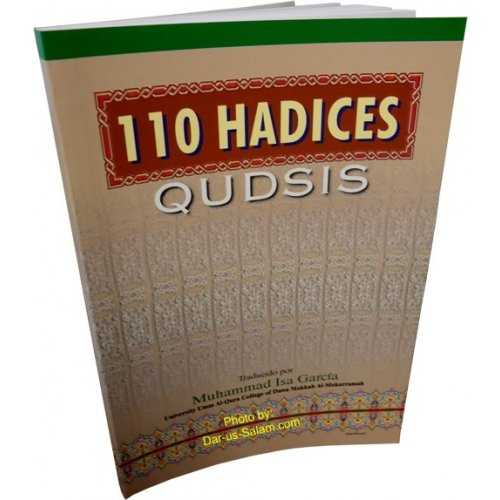




 Read the 2 reviews
Read the 2 reviews
| Subtitle | 110 Ahadith Qudsi |
| Translator | Muhammad Isa Garcia |
| Binding | Paperback |
| Pages | 118 |
| Size in Inches | 5.5x8 |
| Size in CM | 14x20 |
| Edition | 3rd - March 2006 |
| Weight (lbs) | 0.34 |
ENGLISH:
All blessings belong to Allah, the Lord of the heavens and the earth. We praise Him, we ask Him for help, we ask Him for forgiveness for our sins, we trust in Him and we seek refuge from the evil within ourselves and the consequences of our evil deeds. We seek guidance. Whoever Allah guides is the rightly guided, and whoever He leads astray has not I bear witness that there is no god but Allah and that Muhammad is His slave and Messenger, who represents for every Muslim his heart, the example, that which he loves and respects the most, and the light that is in Him. This book is a compilation of Hadith Qudsis or sayings of Allah, may He be praised and exalted. Because it is considered a special kind of prophetic saying, we will expound on this type of saying. The following are the words with which the scholars have defined one: First: "The Quran." It was defined as "the word of Allah, considered worship." sent down upon the Prophet Muhammad, the recitation of which is Then "the word of Allah"
excludes everything that does not come from Him. "Sent down upon the Prophet Muhammad" excludes what was revealed to the previous prophets. And the saying: "Whose recitation is considered worship." It excludes other revelations such as the prophetic hadith and the hadith qudsi, which we will describe below. Second: The hadith qudsi. It was described by scholars as every saying that the prophet attributed to his Lord, without attaching it to the Quran.
In this way, we find that both the Quran and the hadith qudsi represent what the prophet attributed to his Lord. So what is the real difference between the two? The scholars have enumerated a number of differences, each difference ultimately becoming a unique quality of the Quran.
1) The recitation of the Quran The Quran is considered worship, but not the reading of the hadith qudsi.
2) The reading of each letter of the Quran is rewarded with ten hasanat, but not the hadith qudsi.
3) The reading of the Quran is considered a pillar of prayer, and the reading of the hadith qudsi during prayer is not permitted.
4) The Quran was transcribed in its entirety during the lifetime of the Messenger of Allah and transmitted (memorized) by countless Muslims, so there is not the slightest doubt regarding its authenticity, while the hadith qudsi requires the same study as the rest of the prophetic hadiths regarding their narrators to certify their authenticity and legitimacy.
5) The Quran cannot be touched by a person in a state of major impurity (gusul), nor by an unbeliever; while there is no such prohibition with the hadith qudsi.
6) Each sentence of the Quran is called an ayat and the set of Ayats is called a surah.
Muhammad Isa Garcia
SPANISH:
Todas las bendiciones pertenecen a Allah Señor de los cielos y de la tierra, lo alabamos, de él imploramos ayuda, le pedimos perdón por nuestros pecados, en él nos encomendamos y buscamos refugio de la maldad que existe en nosotros mismos, y de las consecuencias de nuestras malas obras. de encontrar guía. Quien Allah guie será el bien guiado, y quien él desvie no ha Atestiguo que no existe divinidad sino Allah y que Muhammad es su siervo y mensajero, quien representa para cada musulmán su corazón. el ejemplo, aquello que mas ama y respeta, y la luz que hay en Este libro representa una compilación de Hadices Qudsis o dichos de Allah alabado y exaltado sea y por considerarse de clase especial de dichos proféticos expondremos a
este tipo de dicho. continuación las palabras con las que los sabios han definido una" Primero: "El Corán". Fue definido como "la palabra de Allah, considerada adoración." descendida sobre el profeta Muhammad, cuya recitación es Entonces "la palabra de Allah"
excluye todo lo que no provenga de El. "Descendida sobre el profeta Muhammad" excluye cuanto fue revelado a los profetas anteriores. Y el dicho: "Cuya recitación es considerada adoración". Excluye otras revelaciones como el hadith profético y el hadith qudsi, que a continuación describiremos. Segundo: El hadith qudsi. Fue descripto por los sabios como todo dicho que el profeta atribuyó a su Señor, sin anexarlo al Corán.
De esta manera encontramos que tanto el Corán como el hadith qudsi representa cuanto el profeta atribuyó a su Señor. Entonces ¿cual es la diferencia real entre ambos? Los sabios Entre ellas: han enumerado un sin numero de diferencias, convirtiéndose en definitiva cada diferencia en una cualidad única del Corán.
1) La recitación del Corán es considerada adoración, no así la lectura del hadith qudsi.
2) La lectura de cada letra del Corán es recompensada con diez hasanat, no así el hadith qudsi.
3) La lectura del Corán es considerada pilar de la oración siendo la lectura del hadith qudsi durante la misma no permitida
4) El Corán fue transcripto en su totalidad en vida del mensajero de Allah y transmitido (memorizado) por un sin
numero de musulmanes, por lo que no existe la mas mínima
duda con respecto a su autenticidad, mientras que el hadith
qudsi requiere el mismo estudio que el resto de los Hadices
proféticos respecto a sus narradores para certificarnos de su
autenticidad y legitimidad.
5) El Corán no puede ser tocado por una persona en estado de impureza mayor (gusul), ni por un incrédulo; mientras que no existe esta prohibición con los hadices qudsi.
6) Cada oración del Corán se denomina aiat y el conjunto de aiats se llama sura.
Muhammad Isa García

